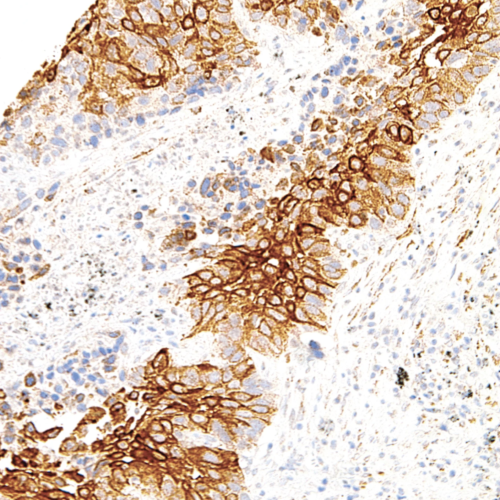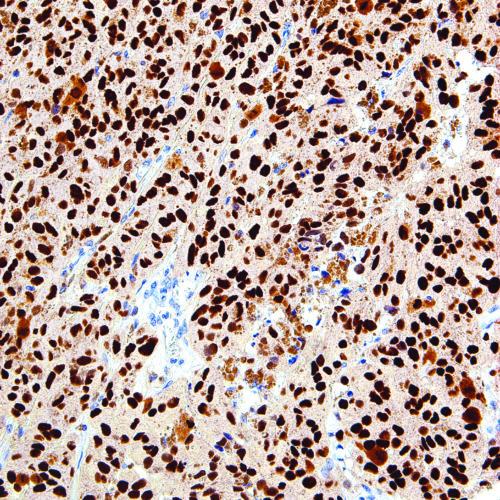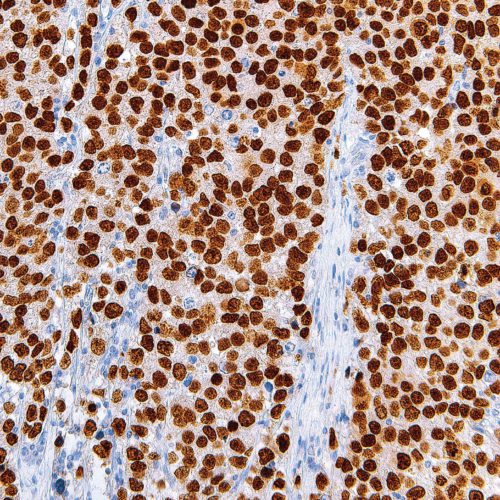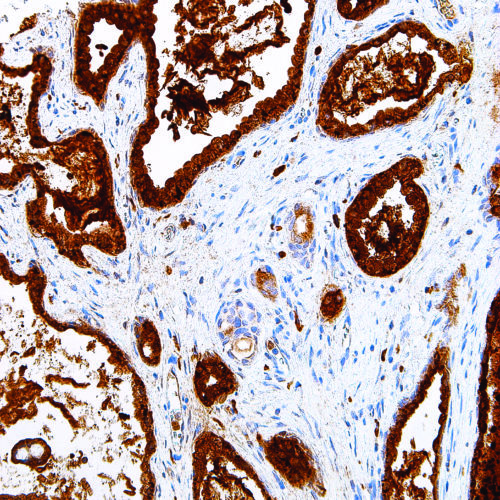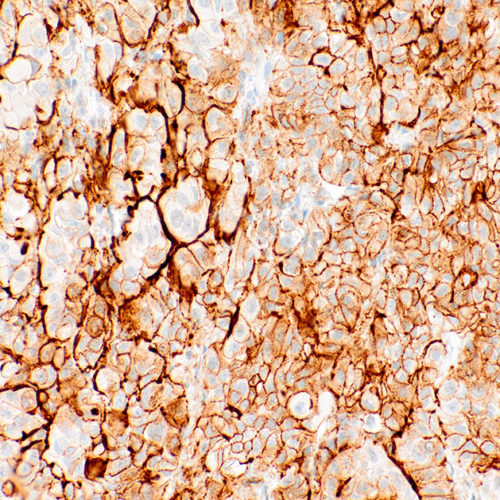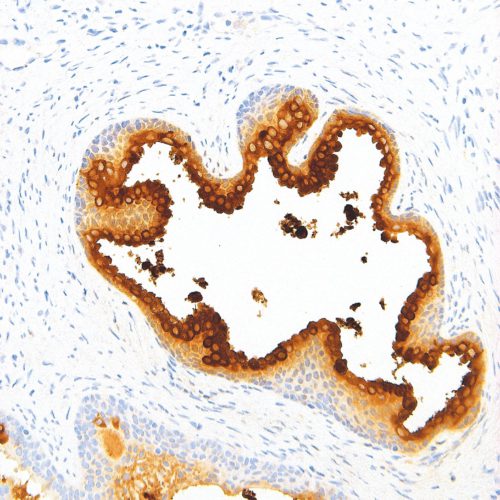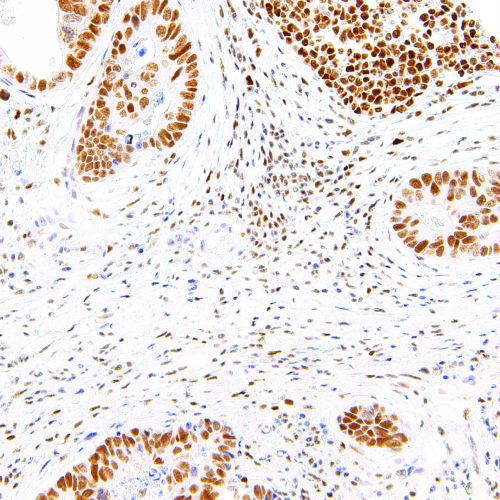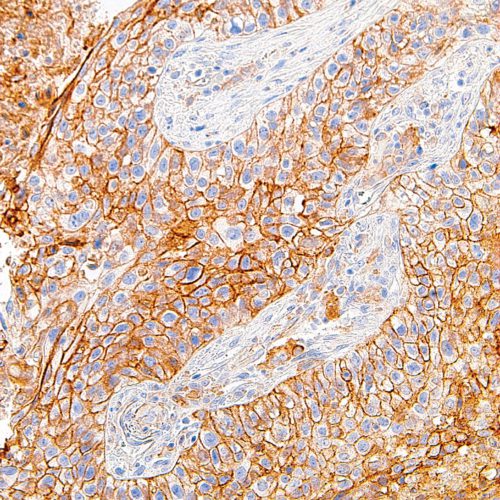High quality products to support Pathologists and Biological and Environmental Scientists
GeneAb™ TAG-72
$95.00 – $370.00Tumor-Associated Glycoprotein 72 (TAG-72) is a glycoprotein found on the surface of many cancer pathologies. Anti-TAG-72 can be useful for detecting some adenocarcinomas and non-neoplastic tissues. This diagnostic grade TAG-72 IVD antibody is useful for identifying adenocarcinomas in positive staining, but in mesotheliomas no staining is observed.
GeneAb™ SOX10
$100.00 – $415.00SRY (Sex Determining Region Y)-Box 10 (SOX-10), also known as transcription factor SOX-10, is a nuclear transcription factor that acts in regulation of embryonic development and in the specification and differentiation of cells of melanocytic lineage. SOX-10 is diffusely expressed in neurofibromas and schwannomas, and mutations in the SOX-10 gene are linked to Waardenburg-Shah and Waardenburg-Hirschsprung disease. Anti-SOX-10 has been shown to be sensitive for conventional, spindled, and desmoplastic melanoma, and has been used to detect metastatic melanoma and nodal capsular nevus in sentinel lymph nodes.
GeneAb™ SALL4
$75.00 – $330.00Sal-Like Protein 4 (SALL4), is a zinc finger transcription factor found in germ cells and human blood progenitor cells, with functional involvement in modulating Oct-4 to maintain embryonic stem cell pluripotency. SALL4 is a useful marker for acute myeloid leukemia, B-cell acute lymphocytic leukemia, intratubular germ cell neoplasia, seminomas/dysgerminomas, and yolk sac tumors (both pediatric and postpubertal). Anti-SALL4 is used to detect embryonal carcinomas, hepatocellular carcinoma (HCC), gliomas, ovarian primitive germ-cell tumors, choriocarcinomas, spermatogonia, teratoma, gastric cancer, breast cancer, and lung cancer. Expression of SALL4 is often associated with poor prognosis in HCC, and with metastasis in endometrial cancer, colorectal carcinoma, and esophageal squamous cell carcinoma.
GeneAb™ PSAP
$55.00 – $210.00Prostatic Specific Acid Phosphatase (PSAP) is a prostatic enzyme found in the glandular epithelium of the prostate. PSAP levels are elevated in hyperplastic prostate and prostate carcinoma, with the highest levels being detected in metastasized prostate cancer. Moderate overexpression of PSAP is also characteristic of diseases of the bone (such as Paget’s disease or hyperparathyroidism), diseases of blood cells (such as sickle-cell disease), multiple myeloma, or lysosomal storage diseases (such as Gaucher’s disease). PSAP is considered more sensitive, yet less specific, than PSA, however Anti-PSAP can act as a useful complement to Anti-PSA under suitable clinical contexts.
GeneAb™ Podoplanin
$85.00 – $490.00Podoplanin is a transmembrane mucoprotein specifically expressed in the endothelium of lymphatic capillaries, while remaining absent from the blood vasculature. The protein is co-localized with VEGFR3/FLT4 in normal skin and kidney. Anti-Podoplanin is useful in the identification of lymphangiomas, Kaposi’s sarcomas, epithelioid mesotheliomas, hemangioblastomas, seminomas, and some angiosarcomas which likely have lymphatic differentiation.
GeneAb™ PSA
$70.00 – $280.00Prostate-Specific Antigen (PSA) is a serine protease of the kallikrein family, that is produced by the prostate epithelium and epithelial lining of the periurethral glands. Although considered prostate-specific, PSA has also been detected in breast tissue, breast tumors, endometrium, adrenal neoplasms, and renal cell carcinomas. Anti-PSA can be used for differentiating high-grade prostate adenocarcinoma from high-grade urothelial carcinoma, as well as for determining the prostatic origin of carcinomas in non-prostate tissues. Anti-PSA recognizes primary and metastatic prostatic neoplasms, but not tumors of nonprostatic origin, and can be useful as an aid to confirm prostatic acinar cell origin in primary and metastatic carcinomas.
GeneAb™ PMS2
$70.00 – $400.00Postmeiotic Segregation Increased 2 (PMS2) is a DNA repair protein involved in mismatch repair. Mutations and deficiencies in the PMS2 gene have been linked to microsatellite instability, and malignancies such as hereditary nonpolyposis colorectal cancer and endometrial cancer. Expression levels of the PMS2 protein may be useful as a screening tool for Lynch syndrome after a colorectal cancer diagnosis. Anti-PMS2 is recommended to be used as part of a panel along with antibodies against MLH1, MSH2, and MSH6.
GeneAb™ PD-L1
$145.00 – $625.00Programmed Death-Ligand 1 (PD-L1), also known as CD274 or B7 Homolog 1 (B7-H1), is a transmembrane protein involved in suppressing the immune system and rendering tumor cells resistant to CD8 T cell-mediated lysis through binding of the Programmed Death-1 (PD-1) receptor. Overexpression of PD-L1 may allow cancer cells to evade the actions of the host immune system. In renal cell carcinoma, upregulation of PD-L1 has been linked to increased tumor aggressiveness and risk of death, and, in ovarian cancer, higher expression of this protein has lead to significantly poorer prognosis. PD-L1 has also been linked to systemic lupus erythematosus and cutaneous melanoma. When considered in adjunct with CD8 tumor-infiltrating lymphocyte density, expression levels of PD-L1 may be a useful predictor of multiple cancer types, including stage III non-small cell lung cancer, hormone receptor negative breast cancer, and sentinel lymph node melanoma.
